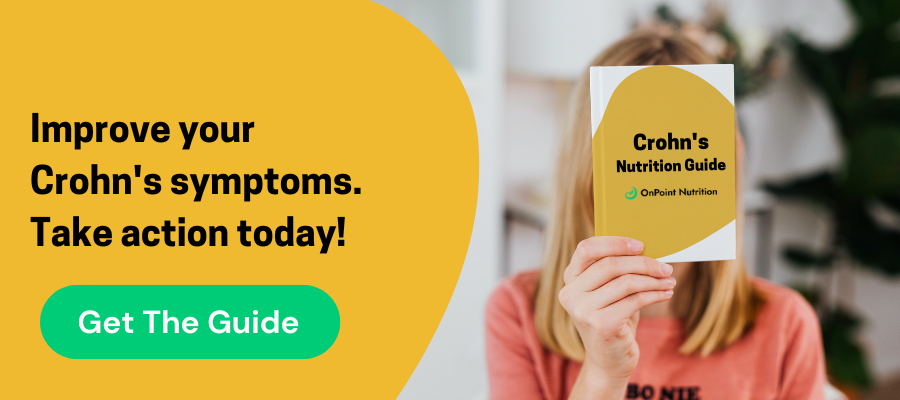
Identifying Crohn’s Disease triggers and monitoring your symptoms are critical steps in leaning to manage the condition. Use the list below to get started.
Crohn’s Disease Symptoms in Women
Women are more likely to experience a few more Crohn’s symptoms than men are. These symptoms include:
- Irregular or painful periods
- Anemia
Crohn’s Disease Symptoms in Men
For the most part, the symptoms that people with Crohn’s experience are the same. However, certain Crohn’s side effects occur specifically within men. Managing your Crohn’s can help avoid the potential associated conditions listed below:
Sexual Dysfunction
Research shows that men with irritable bowel disease (IBD) are more likely to experience sexual dysfunction, especially if you are younger than 50. Crohn’s Disease is characterized by chronic inflammation in the gut. When there is inflammation in the body, especially over long periods of time, hormones and hormone regulation may be affected. The imbalance in hormones is what causes erectile dysfunction and reduced sex drive. If you have Crohn’s and are experiencing any sort of sexual dysfunction, contact your doctor to develop a treatment plan.
Temporary Infertility
Certain Crohn’s medications may cause reductions in sperm counts. If you are considering having children, check with your doctor to ensure your Crohn’s medication will not interfere.
Prostate Cancer
Research shows that men with Crohn’s are four to five times more likely to be diagnosed with Prostate Cancer. Researchers believe this correlation stems from the constant inflammation in the rectum, which is located right next to the prostate. Talk to your doctor about routine prostate cancer screenings.
Depression
The link between IBD and depression is suspected to stem from the condition interfering with quality of life and the effects of gut health on the brain. Research also shows that men are less likely to seek treatment for depression than women, leaving a lot of cases undiagnosed. Treating depression can be a critical piece of managing your Crohn’s Disease. We recommend reaching out to a therapist, counselor, or friends and family to help find the right treatment path.
Crohn’s Disease Symptoms for Women and Men
Outside of these gender-specific symptoms, both women and men tend to experience similar Crohn’s Disease symptoms. The most common symptoms are:
Abdominal Pain & Cramping
There may be multiple causes of your Crohn's cramping. Bowel blockages and fistulas may cause the cramps, which can be relieved with medications. The narrowing of your colon, called a stricture, can also cause cramps... separately, sometimes stress may cause your symptoms.
Persistent Diarrhea
For both colitis and Crohn's, diarrhea can be a common symptom. Diarrhea can be caused by many factors: supplementation (notably, iron), infection, diet and food sensitivities, malabsorption of fats, or even medication designed to improve your condition
Fever
Fever may develop as a side effect of your intestine being inflamed, or may be coincidental with an infection that your body is fighting. Lastly, sometimes medication can cause fever
Rectal Bleeding
Bleeding is most concerning if you develop an anal fissure. The good news is that fissured can be treated successfully without surgery
Constipation
Similar to cramps, both strictures or not eating enough fiber can cause constipation if you have Crohn's
Urgent Bowel Habit
The general inflammatory response from Crohn's disease can trigger urgent bowel urges. Treating your body's inflammatory response can also relieve the urges to go to the bathroom
Loss of Appetite
This symptom affects 1 in 5 people with Crohn's Disease. Many people experience lack of appetite because of their underlying discomfort and pain during a flare
Weight Loss
Weight loss has many causes, so it is important to work with your dietitian to determine the root cause of potential weight loss. Factors include loss of appetite (from medication, discomfort, etc.), nutrient loss, malabsorption, medication, and even hormone imbalance
Fatigue
Fatigue can be exacerbated by loss of appetite and cramping/discomfort. In addition to adopting an improved Crohn's Diet, talk to your doctor about medication side effects. Your doctor may also investigate if you have anemia.
Night Sweats
Similar to fever, your night sweats are most likely to be associated with the body's natural inflammatory response. If they persist after general treatment or medication (starting with Tylenol), consult your doctor
Changes in Menstrual Cycle
Hormone levels, your general nutrition and nutrient absorption, and stress can all impact your menstrual cycle. Treating your Crohn's / IBD is the best way to restore normal menstrual cycles
Skin Conditions
Skin problems are the second most common Crohn's complication that occurs outside of your GI tract. You may experience bumps, sores, or blisters across your body
Joint Pain
Do not be alarmed if your Crohn's is associated with joint pain. Joint pain occurs in ~55-70% of people with Crohn's, typically without inflammation (arthritis)
Fistulas
Your doctor will be able to detect these. The good news is that they can first be treated with medication. There are a variety of associated symptoms and considerations, depending on where the fistula forms within your GI tract
Crohn’s Disease Triggers
While many people with Crohn’s Disease will experience similar symptoms, the triggers to their symptoms are not always the same. The range of triggers is why there is no “one size fits all” approach to Crohn’s management. Any of the below triggers may cause your Crohn’s Disease symptoms:
Alcohol
Alcohol can affect the immune system, prompting changes to chemicals that cause inflammation in your gut. These chemical changes can disrupt the functioning of the gut. Individuals with Crohn's are more susceptible to intestinal damage
High-Fat Foods (fast food, foods cooked in butter or oil)
Some foods may trigger cramping, bloating, and diarrhea. High fat foods such as fast food may lead to specific changes in the gut bacteria that could fight harmful inflammation and trigger symptoms.
Carbonated Beverages
Carbonated drinks contain carbonic acid, which irritates the digestive tract and could trigger unwanted symptoms. In addition to the carbonation, carbonated beverages often contain high amounts of sugar which can disrupt the digestive tract.
Caffeine (coffee, tea, energy drinks, soda)
Caffeine increases the wave-like motion of the GI tract, which is what propels waste through the system. If you tend to have diarrhea with your Crohn's flare, caffeine is not your friend. Caffeine can also lead to bloating, which may irritate the GI tract and cause worsening symptoms.
Corn
Corn is high in insoluble fiber, which can cause cramping . Corn is also considered a whole grain, so it’s a hard food to digest and can cause irritation and diarrhea. It can be difficult for your body to break down corn if you have Crohn’s and, and eating corn can cause uncomfortable symptoms during a flare up.
Dairy products
Many individuals with Crohn's may be okay with certain dairy products. However, whole fat dairy products like whole milk, ice cream and sour cream may be a problem because of the higher fat content. Studies have shown that high-fat and high-lactose dairy products can agitate flares for people with Crohn’s Disease. Higher fat dairy products can trigger a flare and cause unwanted symptoms because of issues with fat malabsorption. Some people with Crohn’s disease are more likely to be lactose intolerant, which means they have difficulty digesting the sugar lactose, which is found in dairy products including milk. When they eat something with lactose in it, bacteria in the colon digest the lactose protein and produce gas. This gas can trigger symptoms and cause irritation.
Foods High in Fiber
High fiber foods can cause a lot of traffic through the gastrointestinal tract. High fiber foods are not completely digested in the small intestine, and exacerbate and trigger unwanted symptoms like diarrhea. People with Crohn’s may benefit from a low-fiber, low-residue eating plan to help manage small intestinal constriction or acute symptoms. This type of diet reduces fiber and “scrap” that can stay behind and irritate the bowels.
Gas-producing foods (lentils, beans, cabbage, broccoli)
Foods containing complex carbohydrates such as lentils, beans, cabbage, broccoli and brussels sprouts are hard to digest. Instead of normal digestion, the body breaks them down using bacteria that produces gas. Certain foods and carbonated beverages can cause gas build up that leads to unwanted symptoms. In individuals with Crohn’s Disease, food is sometimes poorly absorbed in the small intestine. This means more undigested food reaches the colon. The bacteria in the colon digests it, but excess gas is produced during the process.
Nuts and Seeds
When nuts and seeds pass through the digestive tract, they are not fully digested. The sharp edges to nuts and seeds can be rough and irritating to the GI tract and cause irritation. Instead, choose smooth nut and seed butters for better digestion.
Raw Fruits and Vegetables
Raw fruits and vegetables are high in fiber and can be very difficult for the digestive system to break down. Too much of this fiber can cause an excess of gas which can trigger symptoms. Cooking vegetables is one way to make them more tender and easier to digest than raw vegetables.
High-fat Meats (red meat, pork)
Crohn’s may affect fat absorption, which can lead to unwanted symptoms. Greasy and fatty meats can wreak havoc on the digestive system of people with Crohn’s. Choosing leaner meats such as chicken and fish, high in omega 3 fatty acids, will treat the digestive system much nicer.
Spicy Foods
Some people report GI stomach pain, cramps, bloating and diarrhea after eating spicy food. As a result, for many people, “spicy” dishes are foods to avoid. These symptoms may be caused by an increase in stomach acid, which builds up when you eat spicy foods. Another reason that many people with IBDs find that some spicy foods trigger their symptoms is because they may be sensitive to foods containing nightshades (black pepper, nutmeg, cloves, mustard, and horseradish)
Whole Grains
The high fiber content in whole grains causes a high amount of traffic through the GI tract, which can irritate your colon and trigger symptoms. Other substances in whole grains may also contribute to your Crohn’s symptoms, such as gluten or fermentable carbohydrates.
Managing your Crohn’s Disease through dietary improvements can change over time, depending on whether you’re in remission or in a flare. For this reason, we recommend working closely with your Gastroenterologist and a Registered Dietitian to develop a Crohn’s management plan that works best for you and your body.
Learn more about how to manage your Crohn's Disease, including foods to eat, foods to avoid, and how to best alleviate your symptoms.
Topics

Kaitlyn Willwerth is a Registered Dietitian at OnPoint Nutrition. Kaitlyn's work focuses on providing individualized health and lifestyle coaching and, most importantly, support. She is a Certified LEAP Therapist and has also completed the Monash University 'Low FODMAP Diet for IBS' online training course for health professionals.




